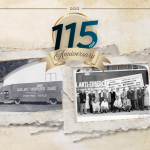Dr. Donald Cockcroft Receives Research Award
Dr. Donald Cockcroft, a former Board member of The Lung Association of Saskatchewan and chair of the Medical Advisory Committee, received the 2006 Saskatchewan Health Research Foundation Achievement Award for Clinical Research
The award was presented by the Honourable Pat Atkinson, Minister of Advanced Education and Employment on behalf of Government of Saskatchewan.
The outstanding health research accomplishments that Dr. Donald Cockcroft has achieved in over 29 years of working in Saskatchewan exemplify a level of excellence that few researchers ever attain. In terms of the criteria for eligibility for the award:
His incredible publication record attests to the very high level of his contribution to health research in Saskatchewan. The recognition of his publications is widespread - over 14,000 other publications cite his work.
His research advances in asthma diagnosis and care have impacted clinical practice for this disease in Saskatchewan, Canada and the world, improving the lives of countless people with asthma.
He has been a key person in the development of the Division of Respiratory, Critical Care and Sleep Medicine and the Institute of Agricultural, Rural and Environmental Health. He also helped to build health research capacity by training and mentoring several young researchers. He has helped to bring millions of dollars in research funding to Saskatchewan through his research grants.
Dr. Cockcroft has made an outstanding contribution to respiratory health, not just in Saskatchewan but nationally and internationally. He is one of the world’s foremost authorities on asthma and is constantly in demand as a speaker in all corners of the globe.
Dr. Cockcroft obtained a Bachelor of Science in chemistry and an MD from the University of British Columbia. He did a one-year internship at Stanford University and spent three years at McGill and one more year at UBC completing his specialty training in internal medicine. Following that he trained at McMaster in Hamilton for two years in the area of asthma and allergies. He was recruited to the University of Saskatchewan in 1977 and joined the Division of Respiratory Medicine, Department of Medicine.
Dr. Cockcroft’s CV is 82 pages long. He has published 187 scientific papers in peer-reviewed journals, 38 review articles, 47 chapters in books, 11 editorials, 25 letters and 24 committee conference reports. He is co-editor of 4 books. He presented talks and abstracts at over 130 scientific meetings and has made an additional 218 invited presentations outside the University of Saskatchewan. He has principal investigator or collaborator on 62 research grants.
Dr. Cockcroft is one of the most widely quoted authorities on asthma in the world. His top 50 publications alone have been cited 14,282 times. He was a co-author of the most widely quoted paper in the world in 1992 – a paper which analyzed asthma medication use in Saskatchewan and found that over-reliance on bronchodilators was associated with fatal and near-fatal outcomes. This research was the basis for developing a warning system in the province to flag potentially inappropriate use of bronchodilators.
Dr. Cockcroft is a member of several professional societies, holding various posts such as the president of the Canadian Thoracic Society. He has been a reviewer and served on the editorial board of various scientific journals. He has served on many grant-review committees.
Dr. Cockcroft has done seminal research on the tests used to diagnose asthma. He has described and characterized the late asthmatic response in which he showed that people with asthma can have either or both an immediate constriction of their airways when exposed to an irritant and a late response many hours after the exposure. He discovered that after a single exposure to an allergen, the airways of a person with asthma will constrict in reaction to everyday stimulants such as exercise and cold air in addition to irritants such as second hand smoke and they will remain sensitive for several days. He has shown that regular use of certain types of medication used to treat asthma can lead to a rebound effect that diminishes the effectiveness of these medications. This has lead to a change in how these reliever medications are prescribed and used. He has postulated that asthma can be caused by repeated exposure to certain substances which leads to a vicious cycle of airways constriction.
Dr. Cockcroft’s research has shown that occupational exposure to isocyanates such as those found in automobile paint can cause asthma. He is a co-author of the Canadian Thoracic Society guidelines for Occupational Asthma which enable the assessing physician to investigate patients with potential occupational asthma and, once diagnosed, to provide appropriate treatment.
In addition to all of this research activity, Dr. Cockcroft has carried a full clinical load, treating thousands of patients during his time in Saskatchewan. He has also done a great deal of teaching both of medical students and continuing professional education for physicians and other health care professionals. He carried a significant administration load for 10 years as the head of the Division of Respirology, Critical Care and Sleep Medicine. During his tenure, Dr. Cockcroft worked to develop a strong research base in the Division.
Dr. Cockcroft has supervised 11 post-doctoral fellows in research programs, some of whom have remained in Saskatchewan and continue to conduct health research. He has been the research supervisor for several residents and undergraduate medical students.
From 1996 to 2006, Dr. Cockcroft was the Ferguson Professor of Medicine – a title which commemorates the work of Dr. R. G. Ferguson and carries a $40,000 per year research professorship from the Lung Association. He is a Life Member of the Lung Association.



